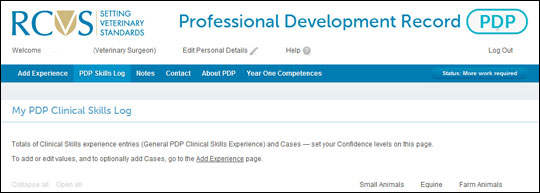-
-
- Council Members
- Role of Council Members
- Council meetings
- Council elections
- Previous election results
- Dr Louise Allum
- Dr Sam Bescoby
- Dr Andrew Clemence
- Dr Tshidi Gardiner
- Dr Reginald Godwin
- Paddy Gordon
- Dr Danielle Greenberg
- Dr Gerard Henry
- Dr Richard Hillman
- Dr Benjamin Kennedy
- Dr Tom Lonsdale
- Dr Darren Partridge
- Martin Peaty
- Alison Price
- Dr Peter Robinson
- Dr Jennifer Simmons
- Dr Sadie Spencer
- Dr Mary Thomas
- William Wilkinson
- Dr Lara Wilson
- Past-Presidents
-
-
-
-
-
- About extra-mural studies (EMS)
- EMS requirements
- Information for vet students
- Information for EMS providers
- Information for vet schools
- Temporary EMS requirements
- Practice by students - regulations
- Health and safety on EMS placements
- EMS contacts and further guidance
- Extra-mural studies fit for the future
-
-
- Code of Professional Conduct for Veterinary Surgeons
- Code of Professional Conduct for Veterinary Nurses
- Contact the Advice Team
- XL Bully dog ban
- 'Under care' - guidance
- Advice on Schedule 3
- Controlled Drugs Guidance – A to Z
- Dealing with Difficult Situations webinar recordings
- FAQs – Common medicines pitfalls
- FAQs – Routine veterinary practice and clinical veterinary research
- FAQs – Advertising of practice names
- GDPR – RCVS information and Q&As
New PDP records online
29 August 2012
We have introduced a new online recording system for veterinary graduates starting their Professional Development Phase (PDP).

The new PDP database sits as a module within the Professional Development Record (PDR), that we launched in April to help veterinary surgeons and veterinary nurses plan, evaluate and record their continuing professional development (CPD).
Bringing the PDP into the new Professional Development Record shows clearly how this stage of a vet’s development is part of the continuum of professional development.
“Bringing the PDP into the new Professional Development Record shows clearly how this stage of a vet’s development is part of the continuum of professional development that starts at university and continues for as long as they practise,” says Freda Andrews, RCVS Head of Education.
“We are also developing a system for students to record their practical and clinical experience whilst at university and, once this is complete next year, the PDR will become a complete record of professional lifelong learning.”
Like the rest of the PDR, the new PDP module offers extra space for notes, and allows documents such as case reports and presentations to be uploaded and stored.
Responding to feedback from users of the old PDP system, the new interface is designed to be more user friendly than the previous PDP database, and contains interactive help, guidance on PDP and an easier means of recording case numbers against the clinical skills lists.
All new graduates from 2012 are able to sign up to use the new PDP site and, once their account is activated, they will also be able to use the CPD area to record any additional CPD they might undertake.
Graduates from previous years who are still undertaking their PDP using the old database may continue on the old system for the time being, although at some stage within the next year or so, the old site will need to be archived.
Anyone who would prefer to use the new system instead should contact the PDP administrator at the RCVS to discuss transferring ([email protected] 020 7202 0736).
As the skills lists have changed slightly, however, an automatic transfer of data from the old to the new isn’t possible.
The PDP links the ‘Day One’ competences that veterinary surgeons have achieved when they graduate to the ‘Year One’ competences which they are expected to have achieved after about a year in practice.
Each vet’s progress through the PDP is supervised by a Postgraduate Dean, and its completion also requires sign-off from the veterinary surgeon’s employer or mentor.
For more information, or to sign up to the PDP, visit www.rcvs.org.uk/pdp.